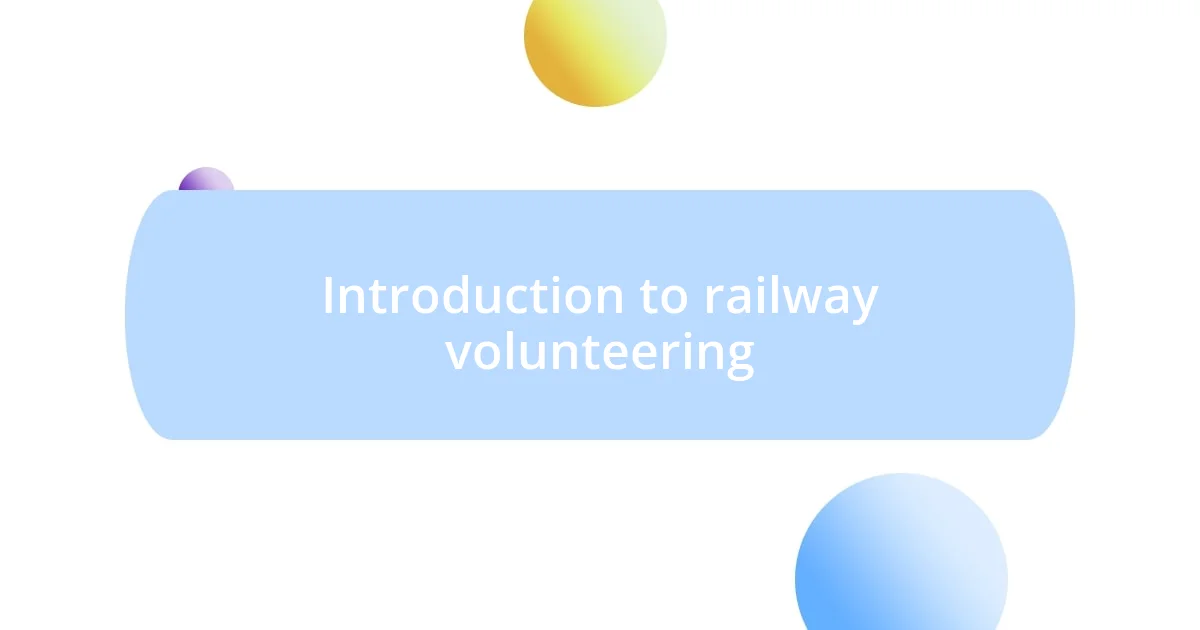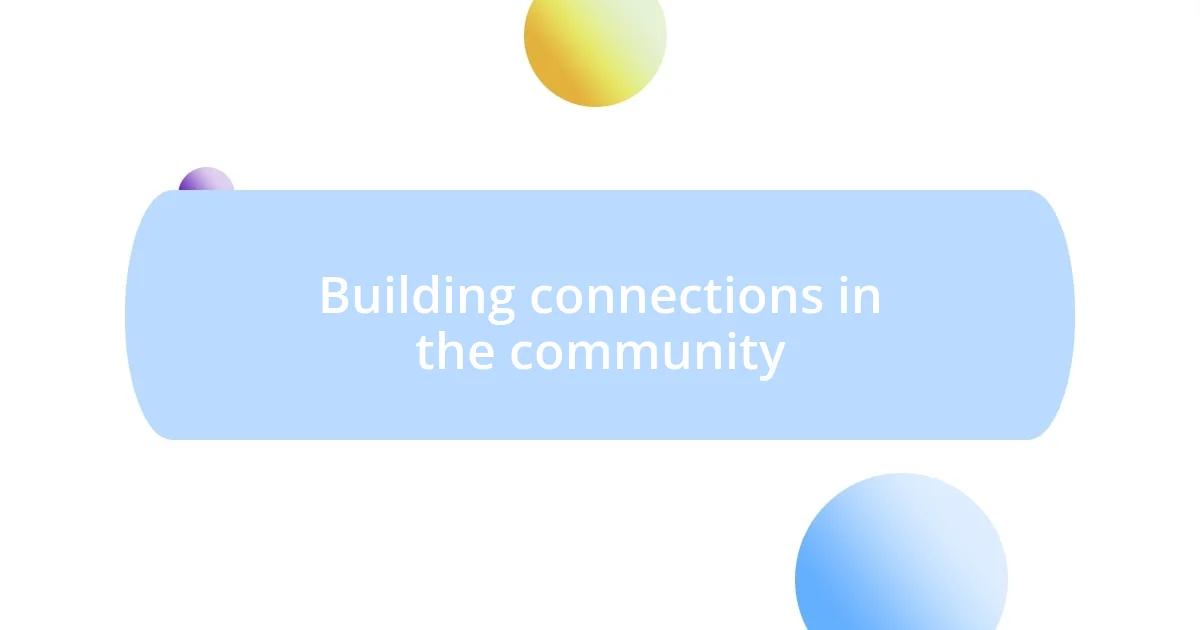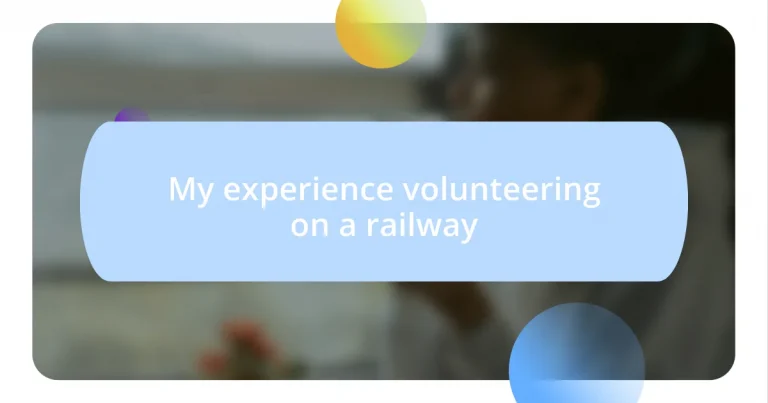Key takeaways:
- Volunteering on a railway fosters personal growth, enhances skills, and builds community connections through shared experiences and heritage appreciation.
- Volunteers gain valuable skills such as communication, technical abilities, teamwork, and leadership by engaging in various roles and facing challenges.
- Sharing volunteer stories encourages others to get involved and promotes reflection and camaraderie among volunteers, enriching the overall experience.

Introduction to railway volunteering
Volunteering on a railway is more than just a chance to lend a hand—it’s an experience that immerses you in a unique blend of history, community, and craftsmanship. I remember the first time I stood alongside seasoned railway enthusiasts, feeling an exhilarating mix of excitement and nervousness as I grasped the magnitude of what we were preserving. Have you ever wondered what it feels like to operate a vintage steam engine, surrounded by other passionate volunteers who share that same spark?
Engaging with passengers and sharing stories about the train’s rich heritage creates a special bond that often feels like family. I can vividly recall a day when a little boy’s eyes lit up after I explained how trains helped shape our world; his enthusiasm reignited my own love for railways. It was in those moments that I realized volunteering isn’t just about the tasks; it’s about the connections we forge and the memories we create together.
Moreover, the satisfaction of seeing a locomotive restored, or a station brought back to life is incredibly rewarding. I remember the thrill of watching our hard work pay off during an event, where the scent of coal smoke mingled with laughter and joy. Isn’t it amazing how a singular effort can bring a community together and invite people to appreciate the timeless charm of rail travel?

Benefits of railway volunteering
Volunteering on the railway opens up a treasure trove of personal growth opportunities. I’ve noticed how much my confidence has bloomed as I learned to operate equipment and interact with the public. Every interaction felt like a small victory, especially when passengers would express genuine appreciation for our efforts. Can you imagine the pride that swells within you when you receive a heartfelt “thank you” from a family enjoying the results of your hard work?
Another significant benefit is the skills development that comes naturally through hands-on experience. I recall the first time I helped with track maintenance; it was hard work, for sure! But the training I received not only taught me the technical aspects but also fostered my teamwork abilities. It’s fascinating how this kind of collaboration can lead to lifelong friendships. Who would have thought that exchanging stories over a shovel could lead to such strong bonds?
Moreover, volunteering can immerse you in the local heritage and history, deepening your appreciation for the community. During one of our restoration projects, we uncovered artifacts that told the story of the railway’s past. The joy of holding a piece of history in my hands was electrifying. It made me realize that through the act of giving back, we not only honor the past but also keep its spirit alive for future generations.
| Benefit | Description |
|---|---|
| Personal Growth | Boosts confidence and fosters a sense of achievement through interaction and accomplishment. |
| Skills Development | Enhances technical and teamwork skills while building friendships through collaboration. |
| Community Heritage | Deepens appreciation of local history, allowing volunteers to engage actively with the past. |

Skills gained through volunteering
Volunteering on the railway has been a transformative experience, and I’ve discovered that I’ve gained a variety of essential skills along the way. For instance, problem-solving quickly became a daily challenge. I recall a day when our vintage train faced a technical issue just before an event. With some guidance, I quickly learned how to troubleshoot the problem and managed to get us back on track. That moment not only sharpened my analytical skills but also imbued me with a sense of empowerment.
The skills I developed can be quite varied, including:
- Communication Skills: Engaging with visitors has taught me how to listen effectively while sharing compelling stories about our railway’s history.
- Technical Skills: From maintaining the engines to operating heritage trains, I’ve gained valuable hands-on experience that has expanded my mechanical knowledge.
- Teamwork: Collaborating with fellow volunteers fostered a strong sense of camaraderie and trust, showing me the power of working towards a common goal.
- Leadership: I often found myself stepping up to guide new volunteers, which helped me develop confidence in my ability to lead and inspire others.
Each of these experiences adds a new layer to my understanding and appreciation of railway operations, illustrating that the skills gained are as multifaceted as the tasks we undertake.

Types of railway volunteer roles
There are numerous roles that volunteers can take on within the railway community, each offering a unique experience. For instance, some of my peers focus on train operations, ensuring everything runs smoothly during different events. I remember witnessing a volunteer learning the art of managing passenger flow; the beaming smile on their face when they successfully directed families to their seats was just priceless.
Maintenance is another crucial area where volunteers play a significant part. I’ve often lent a hand during the upkeep of our historic trains and tracks, and the sense of accomplishment after a long day’s work is invigorating. Have you ever spent hours cleaning a locomotive, only to see it gleaming in the sunlight? That visual reward makes every moment feel worthwhile.
Then there are roles that involve engaging the public, such as leading tours or educational programs. It’s not just about sharing facts; it’s about igniting passion in visitors who step on board a heritage train. I recall sharing stories with kids who gazed up at me with wide eyes, hanging on to every word. Moments like that remind me of the impact we can have, transforming curiosity into a love for railway history.

Preparing for your first shift
As I prepared for my first shift, I vividly remember a mix of excitement and nerves bubbling inside me. I found that packing essentials like water, snacks, and a pair of sturdy shoes was just as important as reviewing the volunteer handbook. Have you ever felt that flutter of anticipation before starting something new? It’s that feeling of stepping into the unknown that can be both exhilarating and intimidating.
On the day of my first shift, I quickly learned the value of familiarity with the environment. Taking a moment to walk around the station helped me get my bearings. I even chatted with seasoned volunteers who were more than willing to share tips and insights. Their warmth made me feel welcomed and reminded me of the strong community supporting each other in this rewarding journey.
I can’t stress enough the importance of a positive mindset. As I stood at the platform, ready to greet visitors, I focused on embracing the experience rather than worrying about making mistakes. Would I remember everything I needed to say? Would I manage my responsibilities? The confidence I gained from the support around me helped me thrive. It’s amazing what a little encouragement can do to pave the way for a fulfilling experience!

Building connections in the community
Building connections in the community is one of the most rewarding aspects of volunteering on the railway. I remember chatting with a local artist during a community event. We both shared a passion for the cultural heritage surrounding railways, and that conversation sparked a collaboration where we used the railway’s history as a backdrop for his art. Have you ever found that one unexpected connection can lead to something beautiful?
As I interacted with different community members, I started to appreciate the diverse tapestry of backgrounds and stories. One day, an elderly gentleman shared tales of his adventures on the very trains we were preserving. Listening to his experiences not only deepened my respect for the railway’s history but also fostered a sense of belonging. It hit me then – building connections isn’t just about the present; it’s about honoring the past and ensuring it lives on through shared stories.
Even small gestures can create strong bonds. I often found myself helping families navigate their way through the station or simply offering a listening ear. One afternoon, a young mother expressed her gratitude for my assistance, saying it made her visit less stressful. Those moments made me realize that kindness and support help knit together the fabric of our community. Have you ever considered how a little compassion can make all the difference in someone’s day? It’s in these interactions that I truly felt the heartbeat of the community, alive and thriving through our shared experiences.

Sharing your volunteer story
Sharing your volunteer story can be a powerful way to connect with others and inspire them to get involved. When I reflect on my time volunteering, I often think about the little moments that shaped my experience. Like that one sunny afternoon when we organized a storytelling session for children at the station. Seeing their eyes light up as they listened to tales of adventure made me realize how sharing our journeys can spark hope and ignite imagination in others. Have you ever witnessed the magic that stories can weave?
Your volunteer stories don’t just highlight your journey; they also reflect the impact of your contributions. I remember meticulously documenting my experiences in a blog dedicated to my time on the railway. It wasn’t just a diary; it became a way for me to share the joy, challenges, and lessons learned with others. Each post resonated with someone in the community, prompting conversations and feedback I could have never anticipated. Has sharing your experiences ever encouraged someone else to take that first step into volunteering?
The stories we share can also lead to deeper reflection on our growth. After a long day of assisting at events, I would often sit down with fellow volunteers to swap tales from our shifts. Those discussions turned into a safe space where we could express our frustrations, celebrate our successes, and laugh at our blunders. It struck me how valuable it was to be part of a collective narrative, fostering a sense of unity and empowerment. How has reflecting on your own volunteer experiences helped you grow as an individual?












